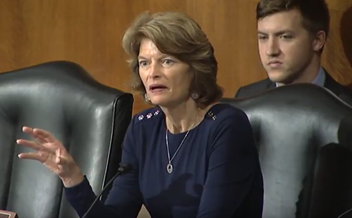Committee Addresses Transparency to Reduce Healthcare Costs
Allows Patients to Choose Higher Quality Care at a Lower Rate
In Alaska and the rest of the United States, patients rarely know the cost of medical services before receiving care, and costs can vary significantly depending on where one chooses to receive care. U.S. Senator Lisa Murkowski (R-AK) this week participated in a Health, Education, Labor, and Pensions (HELP) Committee hearing to reduce healthcare costs by making healthcare information on cost and quality more transparent.
The hearing featured witnesses Leah Binder, President & CEO of the Leapfrog Group, a nonprofit in DC dedicated to improved safety and quality in hospitals; Bill Kampine, co-founder and Senior VP of Client Analytics of the Healthcare Bluebook, a company aimed at providing transparent cost and quality information about medical procedures across the country; Nancy Giunto, Executive Director of the Washington Health Alliance, a nonprofit organization representing 185 member organizations, aiming to improve the quality and accessibility of healthcare; and Ty Tippets, Administrator of St. George Surgical Center Utah, a physician-owned ambulatory surgical center.
The hearing focused on how making healthcare information transparent on cost and quality allows patients to choose high quality at the lowest costs, equips employers to better negotiate contracts with insurance companies and providers, and allow hospitals and providers to improve their quality and lower prices to remain competitive in the market. During the hearing, Senator Murkowski spoke to the challenges in Alaska and the need to improve healthcare cost transparency.
(Click the image for the video.)
“There’s been a lot of discussion as we have looked to differing ways that we can help families when it comes to healthcare costs. I’ve been working with a colleague of mine on making sure that we are able to have Health Savings Accounts that are robust enough to help cover those costs. But if I have a good nest-egg of a HSA sitting over here, but I don’t really have an ability to shop wisely and use those saved dollars wisely, what are we doing? So this conversation is so very important when we talk about transparency,” said Senator Murkowski. “I live in a state and a place, Anchorage is our biggest population center, but we just don’t have a lot of competition, so if you are looking to go to the hospital in Bethel, there’s no point in shopping around because you have one and the same is true in just about every community outside Anchorage, Alaska.”
Senator Murkowski asked witnesses on what role Congress has in mandating the education and engagement aspects critical to increasing healthcare cost transparency.
“The role of government should actually be as narrow as possible in looking at this issue. I think the role of government is to ensure that the data and information is scientifically sound, reliable, and available. And then make that available to public entities like all of us, and then we have incentive to reach out to the public and engage them,” answered Leah Binder, “We need more data, publically available data that we can use.”
“First, help us all teach consumers that healthcare is shop-able,” Nancy Giunto explained. “I would also say that there are many organizations called Regional Health Improvement Collaboratives around the country that have all of the stakeholders convened around the table to try to work on this issue in their local environment,” “When things get solved locally with people who have skin in the game, it’s an opportunity for improvement.”
“Most people are healthy most of the time, and so they don’t think about this and it is key to educate up front. What we know is that if consumers know they need to shop, and they know that prices vary, and they know quality varies, then they’ll shop and they’ll get better value. But you can’t do it at a rifle-shot, it has to be continuous. So, someone with heart disease has to know about this issue when they ultimately consume, people with other conditions as well,” answered Bill Kampine. “So a steady drumbeat a regular communication, I do think we do that. That’s our responsibility, but we need the data to be able to do that, but that is probably the biggest key.”









